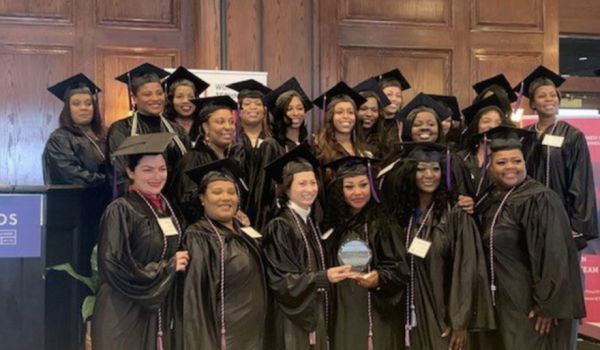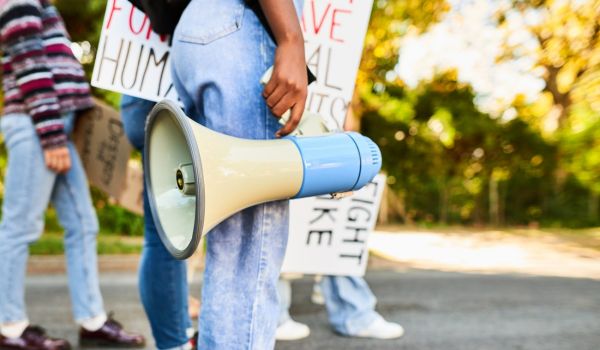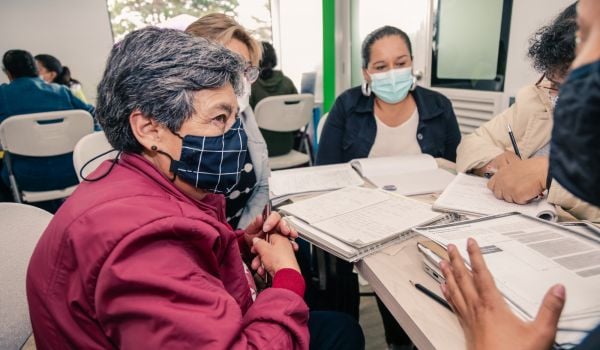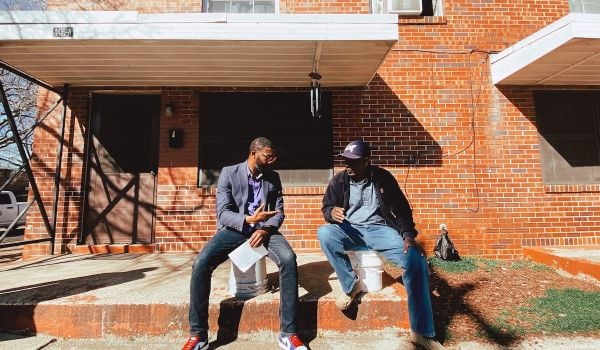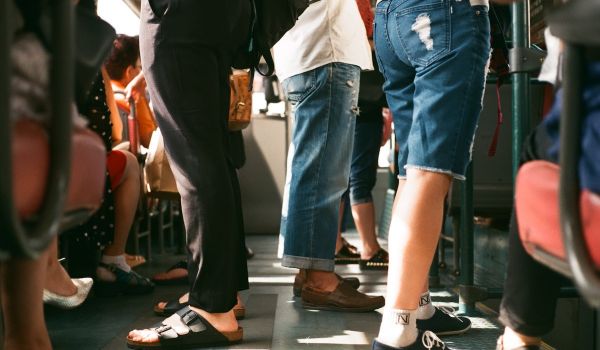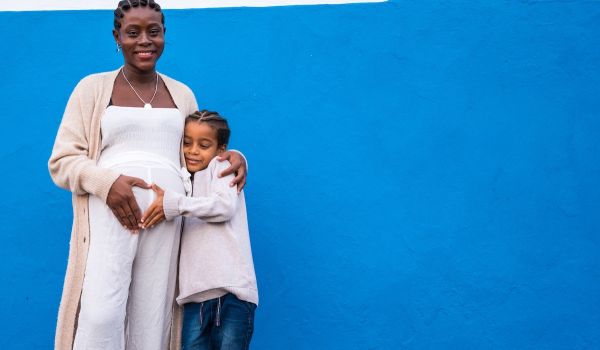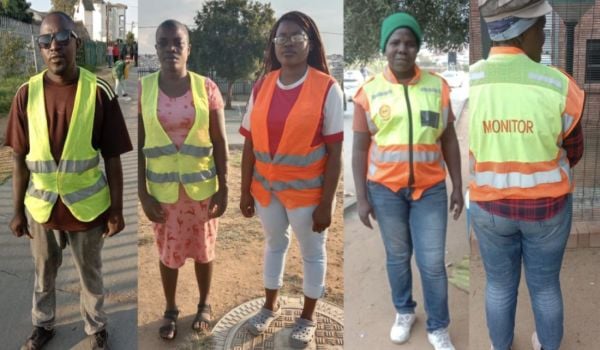Ebony Beals takes after her dad. Originally from Canton, Mississippi, he founded a string of successful small businesses in the Los Angeles area, including an auto repair shop, a corner store, a screen print T-shirt shop, a car wash. Toward the end of his life he owned a bike shop and became a barber with his own barbershop, both of which ran for well over a decade, according to Beals.
Born and raised in Southern California, Beals moved to Mississippi 13 years ago, and later this year she’ll celebrate the fifth anniversary of Tousled & Teased Hair Lounge, her own salon just outside of Jackson.
“My dad always said, don’t work for the man, just work for yourself, no one can put a restriction on how much you can make and how quick you can make it,” says Beals. “What he didn’t tell me though was that I was going to work and never stop. Even when I’m off work I’m thinking about work and the different ways that I can make money. Those are the things he didn’t tell me. And even if you didn’t work and make money, the bills are still going to roll in.”
That reality came to pass suddenly in March 2020, as the pandemic took hold and Beals had to close down her salon. But that same month, she received the first of twelve monthly payments of $1,000 in unrestricted cash, as part of Magnolia Mother’s Trust, a guaranteed income demonstration program that Beals actually helped design.
“Even though I closed down I still had to pay rent and lights and internet and cable,” says Beals. “It just made it work. Everything worked out and there was no gap because that money filled in a little bit of space. I was just happy that I was able to pay the bills without falling so far behind.”
In the summer, the salon opened back up with very strict limitations — only one client in the salon at a time, no other workers in the salon with her except her middle child, Madison, 15 years old. “She is my young apprentice,” says Beal. “Everything I know I have taught her. Even the business portion of it. So if I do what I do really well, she’s going to do what I do even better because she’s 15 and she’s amazing at what she does already.”
With some of her business income restored, she started using some of the extra $1,000 a month to invest in the salon. She hired an interior decorator, bought some new equipment, a new chair, and added a pedicure station. “Every time I got money, I would buy something new for the salon. Something I could point to and say I got the most out of that investment,” Beals says. “It went from a nice salon to even nicer.”
She even saved up a bit — but then had to spend it all in February, when heavy winter storms and years of disinvestment resulted in mass water and electricity shut offs in and around Jackson, which lasted at least three weeks.
“At home we didn’t have power for five days, no water, no options other than to stay at a hotel,” says Beals. “And of course I had to feed my family, then replace food that spoiled in the fridge at home, and lots of water.”
Beals never thought the guaranteed income would actually come to pass, even as she was meeting with other mothers like her from around Jackson, in 2018, to collectively imagine what a guaranteed income program could look like. That program just completed a lottery to select its third cohort of mothers, at least 100 of them, all of them living in federally subsidized housing in Jackson. With its third cohort, this pilot in Jackson has now surpassed the one in Stockton, California, as the longest-running guaranteed-income pilot currently underway in the country.
The full analysis of the Jackson program’s effects is still being completed, but the results so far are promising. Compared to a control group of similarly situated mothers in Jackson, beneficiaries of Magnolia Mother’s Trust are 40 percent less likely to report debt from emergency loans; 20 percent more likely to have children performing at or above grade level; 27 percent more likely to seek professional medical help for sickness or chronic illness; and are able to budget up to $150 more for food and household costs, resulting in lowered food insecurity and struggles with basic needs.
“When we started this, and still to this day, no one [in the United States] has done guaranteed income with a population as low-income as ours,” says Aisha Nyandoro, executive director of Springboard to Opportunity, the nonprofit that created Magnolia Mother’s Trust. “Most individuals doing guaranteed income are doing it with individuals they consider the working poor and I’m doing air quotes around that because our families are working but we’re in a state where the minimum wage is the federal $7.25 an hour. So I have families who on average make $11,000 annually.”
The ultimate goal for Magnolia Mother’s Trust — as with Stockton’s guaranteed income demonstration program and dozens of other programs in process — is to gather evidence to make the case that cash without restrictions is a crucial and powerful component of the social safety net that the federal government should provide.
“I definitely think we need federal policy,” says Nyandoro. “I think the way that we get there is by there being multiple studies and entry points and multiple conversations about this work and multiple proof of concepts that this works and it does help families get out of poverty and it does help families have the dignity necessary to actualize their dreams and does help families show up differently in their communities, allowing them the privilege of hoping and dreaming and living out their aspirations.”
Nyandoro has convinced at least some private philanthropy that doing this to help shift federal policy around the social safety net is worth their dollars. Magnolia Mother’s Trust is funded entirely by private philanthropic donors. She doesn’t envision cash without restrictions as replacing all other forms of federal support, but rather she sees it as a key complement to all the others, and could even be the missing piece to help actually move households along so that they no longer need public assistance of any kind.
That’s where the conversation began in the first place.
Springboard to Opportunity serves around 5,000 residents living in 11 different federally subsidized housing developments around Jackson. It provides wraparound services like career development support, matched savings programs, after-school programs and more — all based on conversations with residents about their needs, Nyandoro says.
“We pride ourselves on taking a radically resident driven approach for our work,” says Nyandoro. “We’ve been doing this work since 2013, and in 2017 I began to get concerned that in spite of all of the wraparound programs and services that we provide, that we were not moving the needle on poverty. We were not seeing a positive matriculation out of the affordable housing complexes at a rate at which I thought we should be seeing given all the work that we were doing.”
So Nyandoro says she started asking residents a simple question — “what are we missing?” And she heard from moms who talked about not having the cash to pay for the extracurricular activities their kids wanted to participate in at school. She heard from moms about having to wait until tax refund season in order to get their car repaired instead of having to spend money for transportation every day to take them to and from work, which on some days ended up costing more than what their paycheck was for that day — or else lose that job entirely.
“It was all of these pieces, and I was like okay it’s not a program or service, it’s cash. So how do we address that?” says Nyandoro. “Also, what they pointed out in those conversations was really how the punitive aspects of our safety net made it prohibitive to actually opt-in to the programs that they needed in a lot of instances.”
Racist and particularly anti-Black racist policymakers have long designed social safety net programs, especially in the South, and particularly in Mississippi, to provide the least possible support with the most possible restrictions.
It was racist southern policymakers who first made sure that Social Security would exclude agricultural workers and domestic workers — the two professions dominated by Black workers (although the rules also excluded some 40 percent of whites). As Ira Katznelson writes in When Affirmative Action Was White, it wasn’t until 1954 when Republicans controlled the executive and legislative branches and southern Democrats lost the ability to shape legislation that the exclusions were removed from Social Security.
Later, when federal cash assistance programs for poor families started rolling out, those southern legislators ensured those programs included clauses and flexibility to allow southern states like Arkansas to provide just $3.52 a month in cash benefits per child in 1940, while the national average at the time was $13 a month.
Welfare reform — the Personal Responsibility and Work Opportunity Reconciliation Act of 1996 — allowed southern states to further degrade already flawed cash assistance programs, under the new banner of “Temporary Assistance for Needy Families,” or TANF. Between 1996 and 2014, the proportion of families in poverty receiving cash assistance nationwide dropped from 68 percent to 23 percent. In Mississippi, TANF benefits today reach less than five percent of families below the federal poverty line.
A big reason for that is the flexibility in TANF that allows a state like Mississippi to enforce strict work requirements for cash assistance, requiring recipients work a certain number of hours per week — despite the reality that low-wage workers are increasingly and more likely than higher-wage workers to face irregular work schedules they can’t control. Work-related sanctions and “other sanctions” accounted for the majority of TANF case closures in Mississippi from 2003-2014, according to the Mississippi Low-Income Child Care Initiative.
“So with all of that data and that reality of where we were, I started saying, ‘How do I go about giving my people money,’” Nyandoro says. “That’s when I started researching what this could or would look like. I never heard of universal basic income at the time. This was 2017. But in my research I learned about UBI and once I had the terminology I had a term, there is a way to give people money. That’s where we got connected to the Economic Security Project and other innovators in the field at the time.”
The Economic Security Project, backed by Facebook co-founder Chris Hughes, supported the Stockton guaranteed income demonstration program and is now funding the Mayors for Guaranteed Income network, and also provided funding for Springboard to Opportunity to design a guaranteed income pilot.
“So in 2018, I pulled together a task force of mothers to help me think about what this could look like,” says Nyandoro. “I called those dreaming sessions. Moms showed up and they dreamed out loud with me. I remember one of my moms at the time was like ‘Girl, stop playing!’ And I’m like, ‘I’m not playing, I’m so serious.’ But how many instances in their lives has anybody said to them ‘I’m going to give you money without strings attached, just because.’ That had not happened. That does not happen.”
They met in a handful of different places. All the apartment complexes Springboard works in have community rooms where they met. A couple were in the nonprofit’s office. Some got so big they had to use another organization’s office with a larger conference room. A few times the nonprofit even rented AirBNBs. “We wanted to get away from the properties, away from the sterile office and create that homey feeling,” says Nyandoro.
Nyandoro says the mothers discussed findings from economic research but had the final say on everything, from the monthly amount to the duration of the assistance. She initially envisioned 18 months, based on prior research about guaranteed income programs, which have become popular as low-income household interventions in other countries. Beals was one of the mothers who said 12 months at $1,000 a month was the right amount.
Too much could hurt. Boosting incomes and savings can result in reductions or complete loss of eligibility for SNAP, or rental assistance.
“We worked with an economist to come up with an educated guess that by doing a thousand dollars a month we could still do good without doing harm, but we didn’t have any actual data to know,” Nyandoro says. “Many moms really did take a chance on the opportunity not knowing whether or not it would actually be a good investment or good opportunity for themselves or their families. And that’s a hard decision to have to make.”
That’s also why it was important for the moms to make this an opt-in decision. And they agreed a lottery was the fairest and most transparent way to decide who could receive the limited resources for a pilot or demonstration program.
“I took all of that and went on maternity leave and had my second kid,” Nyandoro says. “While I was on maternity leave is where I had the bandwidth — it’s crazy how you find bandwidth. It was like my sabbatical, honestly. When I think about it now I’m like it seems crazy. Sometimes I would be up in the middle of the night listening to some of the tapes [from the dream sessions] while he was asleep. Or in the middle of the day I would be writing out the program design while he was napping. So I just had this magical moment of free space where I could actually think, and I used that time to develop the program model for Magnolia Mother’s Trust, and raised the resources necessary for the pilot.”
The name came from a couple different places. The Magnolia is Mississippi’s state flower, but it’s also Nyandoro’s grandmother’s favorite flower. “Mothers,” because, Nyandoro says, “we’re rooted with our moms, wanting to make sure they were included. And then trust, there’s the two meanings with trust, we’re going to trust our families but also thinking about trust funds and wealth and those pieces.”
So far, Nyandoro says, they have seen in early results that on average mothers have seen a reduction of other benefits of three to four hundred dollars a month, but the net gain they still have from the cash assistance is six or seven hundred dollars. “And they appreciate the fact they have it in cash,” says Nyandoro.
The payments also flow through newly established bank accounts for the mothers, at Hope Federal Credit Union, the Jackson-based regional credit union with a community development focus.
“We already had an established relationship with Hope Federal Credit Union, so we worked with Hope to establish banking accounts with no fees and allowed moms to access ATMs without having to incur fees,” says Nyandoro. “That was important to us to help them establish checking accounts and important for our mothers as well because so many of them talked about wanting to establish banking relationships and wanting to repair credit and not having to use predatory lenders. We do know some individuals saved up and bought cars.”
In this newest cohort, the child of each mother will also have a 529 education savings account opened up in their name with an initial $1,000 deposit from Magnolia Mother’s Trust. They’re expecting between 250-300 children will benefit from the accounts, which can be used later to fund tuition for college, vocational training or other qualified educational expenses like textbooks.
The pandemic provided even further evidence to contradict the deeply embedded racist narratives that have shaped the existing social safety net. With all the expanded unemployment benefits and stimulus checks, researchers have had more data than ever to analyze, and new research during the pandemic from Yale, the Federal Reserve Bank of Chicago, the Federal Reserve Bank of New York, and the National Bureau of Economic Research piled on top of older research that these kinds of unrestricted cash benefits don’t reduce incentives to find a job.
But those old narratives still persist among policymakers, as well as among those living in poverty who are taught they are poor because they’re not smart enough or working hard enough.
“The hardest part about this work is the way that we still view poverty in this country, that we really still see poverty as a moral failing, we don’t really understand individuals are not poor because they choose to be poor, that if you are making $7.25 an hour, you cannot save your way out of poverty,” Nyandoro says. “And we don’t have those conversations so we feel like individuals are poor because they don’t work enough, they’re not thrifty enough, they’re not doing the right things and they just should do better, and that’s not true, the reality is they can’t do any more than they’re already doing and it’s time for us collectively to do better and that means putting policies and systems in place that will work for all of us and not just a subset.”
This article is part of The Bottom Line, a series exploring scalable solutions for problems related to affordability, inclusive economic growth and access to capital. Click here to subscribe to our Bottom Line newsletter.

Oscar is Next City's senior economic justice correspondent. He previously served as Next City’s editor from 2018-2019, and was a Next City Equitable Cities Fellow from 2015-2016. Since 2011, Oscar has covered community development finance, community banking, impact investing, economic development, housing and more for media outlets such as Shelterforce, B Magazine, Impact Alpha and Fast Company.
Follow Oscar .(JavaScript must be enabled to view this email address)




